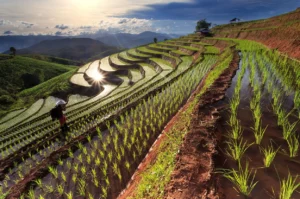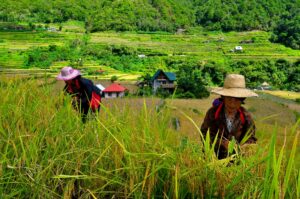The 16-year partnership between the International Rice Research Institute (IRRI) and the Rural Development Administration (RDA) of South Korea has made a real-world impact through the transfer of knowledge and skills.

.
In 2009, after attending a workshop in South Korea, Pham Duc Hung, head of the Cultivation Department at the Vietnam Academy of Agricultural Science, developed a pilot production model for some new rice varieties that led to an increase in the yield and income of hundreds of Vietnamese farmers.
Dr. Hung is one of the almost 300 people who attended the Rice Technology Transfer Systems in Asia (RTTS) workshop, an international training program implemented by RDA and IRRI that changed countless farmers’ lives for the better.
The goal of the RRTS Workshop, which ran from 2002-2018, was to share relevant information, extend applicable components of Korean agriculture and technology that participants can apply in their home countries, and build the capacity of the participants for enhancing the agro-industry technology transfer system. Among other things, it also aimed to improve technology promotion and delivery of knowledge and skills to participants through various interactive and participatory learning methods.
This workshop has attracted researchers, agriculturists, agricultural research officers, extension practitioners, and provincial seed coordinators in their respective organizations and institutions from different Asian and African countries. These include Bangladesh, Cambodia, India, Indonesia, Laos, Mongolia, Myanmar, the Philippines, Sri Lanka, South Korea, Thailand, Vietnam, Côte d’Ivoire, and Nigeria.
The highlight of the training workshop is the participants’ reports where they present their plans for their respective countries.
RDA and IRRI have consistently provided significant efforts in making the workshop as relevant as possible by including a breadth of training modules assessing various topics such as Agricultural Research and Development and Extension in Korea, Introduction of Korea Program on International Agriculture projects, and Presentation of ICT Tools such as the Rice Knowledge Bank and Rice Doctor to expand the participants’ knowledge in the latest trends and studies in agriculture.
Field visits to different areas of interest including the National Institute of Crop Science, the Agricultural Produce Distribution Center, and the Saemaeul Undong Training Institute, also exposed the participants to the different aspects of South Korean science and agriculture.

Delivered what it promised
In 2019, RDA assessed the relevance, effectiveness, efficiency, impact, and sustainability of the RTTS at an evaluation workshop at IRRI Headquarters in the Philippines. The activity was attended by 25 RTTS participants from Cambodia, Laos, Mongolia, Myanmar, Sri Lanka, Thailand, and Vietnam. The evaluation workshop, together with several surveys and interviews provided the basis for the report, Impact Assessment of RDA’s Training Program on Rice Technology Transfer Systems in Asia.
Through discussions, meetings, and demonstrations in their home countries, the participants shared what they learned from the workshop–a valuable insight to look into the sustainability of the RTTS training workshop and the continuation and application of the learnings which were also part of the objectives of the workshop.
In all aspects considered, the RTTS workshop was able to deliver what it promised, albeit with some limitations. However, based on the recommendations of the participants, the training workshop can be improved to cater to the changing realities of agriculture and the rapid development of technologies that can benefit many.
On the other hand, several participants also noted that the training modules heavily focused on South Korean tools and technologies that may not be realistic and applicable in their own country. A recommendation on this area was to conduct a training needs assessment to address the needs of the participants and to diversify the participant selection.

In their own words
Nevertheless, the workshop still proved to be effective for them, particularly the training on presentation and facilitation skills and helped them realize the work they need to do upon returning to their countries. This is evident in several of the participants’ feedback especially when they implemented their work plans after the workshop.
“The most important change for me came when one of the IRRI training staff came up with her Facilitation Skills,” said a participant from Nigeria who attended the 2017 RTTS Workshop. “She was very easy to talk to. She made me understand that, as an agricultural extension worker, you need to guide your group in sharing their opinions and ideas and also fears. This will enable you to know their challenges and experiences hence working towards achieving your goals. I used to find it a little bit difficult relating with my farmers but after her session in the training, it changed.”
Ms. Priyangika Kumari Jayaweera, an agricultural instructor in the Department of Agriculture in Sri Lanka, started working with farmers and extension agents after attending the RTTS Workshop in 2014. She conducted machinery demonstrations and introduced new technologies such as farm mechanization which resulted in an increase in the farmers’ yield in their local area. According to her, the farmers were able to cut down the cost of herbicides and labor as their yield increased from using the machines introduced to them during the implementation of her mechanization project.
In terms of the training’s effectiveness, most of the participants appreciated the inclusion of the presentation of different tools and technologies that South Korea uses in their agriculture.
Yin Hla, a participant from Myanmar who attended the RTTS Workshop in 2009 noted how the lessons she learned significantly helped in making her own teaching modules on agriculture.
“After attending this training, I achieved improvement in sharing my knowledge with the students,” Ms. Hla said. “I got new ideas in teaching lessons to the students in my State Agricultural Institute, Patheingyi. I was able to improve the knowledge of students in my institute. There were more benefits to our production and sharing technology.”

.
Indeed, several participants have since then executed the projects they presented in their work plans. Like Dr. Hung’s involvement in their organization in Vietnam, more participants have mentioned their contributions in their own institutions especially towards their designated target groups in their area.
In Thailand, a technology transfer project on the use of insecticides in Phra Nakhon Si Ayutthaya Province resulted in a 50% decrease of rice black bugs in their area. This is attributed to the efforts of Ms. Sukanya Arunmit, Senior Entomologist in Thailand’s Bureau of Rice Research and Development who was also a participant of the RTTS Workshop in 2016. Her efforts in arranging a training course for the local staff and farmers significantly addressed the infestation problem in the province.
The workshop not only affected the participants but their colleagues in their home countries as they continuously share what they learned from the experts and their co-participants during the workshop.
“Undeniably, the chance I had to interact with people of diverse cultures has considerably influenced my interpersonal skills,” said Ms. Ma. Cecilia Gatbonton, a 2015 RTTS Workshop participant from the Philippines. “Significantly, I also had a better understanding of the Korean way of life, their deep love of their country and how proud they are today being one of the world leaders in the development of cutting-edge technologies.”
For the full impact assessment report on the RTTS training workshop, you may visit this link.
__________________
Ms. Saquido is a content and product development consultant at IRRI Education.







Good